|
IT'S IMPOSSIBLE TO look down to the sideline, at the man standing alone, squinting out at the field with his default look of irritation and disgust, and not wonder what he's doing there. He looks at the papers he's holding, squinting harder, and jots down something with the pencil stub in his right hand before peering back onto the field as if he's trying to figure out what, exactly, is taking place in front of him. He's 73 years old, the hair under and inside his visor showing signs of early comb-over. There is a berth around him, a wide one, and it's rare that he approaches anyone or anyone approaches him. An assistant runs over every so often and hands him a tablet that he jabs with his finger a few times before handing it back. He occasionally barks at an official. He walks to one end of the sideline to watch a few plays from behind the line of scrimmage, and the negative space moves with him, like he's emanating an invisible force field. He is the most famous and successful coach in NFL history, long past the age of needing to prove anything to anybody, even further past the age of needing the money or the work, and yet there he is, coaching a University of North Carolina football team that, at 4-7, has proved stubbornly unable to bend to his will. It's like watching a monarch preside over a small-town school board. He coached the most envied and despised team in the NFL, and now he coaches a below-average ACC team that elicits almost no emotional response. He continues to preach the tenets of his faith: Fix your mistakes, get better every day, do your job. There is not and never has been room for frivolity, or peripheral concerns of any flavor, or even outward signs of joy. The rare smile, the northern white rhino of the sports world, is more a baring of teeth. We are left to presume he enjoys what he's doing simply because he keeps doing it.
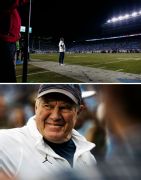 DESPITE THE DEPRESSING season, despite his personal life spooling into the open, despite the most basic question -- Why is he doing this? -- there are times when Bill Belichick shows it's all still in there. It is nearly an hour past the final play of UNC's game against Stanford when he finally appears at the lectern in the atrium of the school's football complex. He stands, as always, and begins to speak about his team's 20-15 win, its second ACC victory in a row and a sign -- fleeting as it may be -- that he just might make this college thing work after all. He looks less weary and uninterested than usual, which means his grumbling is delivered loudly enough to hear. He graciously tells a young man who asked a lengthy question about the tendencies and strengths and weaknesses of UNC's next opponent, Wake Forest, that he doesn't have an answer for him yet but that it's a great question. He makes eye contact. He's trying. For once, the back-and-forth doesn't feel like penance. Fewer than 15 minutes pass before Brandon Faber, Belichick's media relations liaison, says the coach has time for one more question. Belichick doesn't move. "We've got time for a couple more if you want," he says, tossing a hand in the air like it's no big deal, like this is how he always operates. "I know I kept you hanging here, so I can go a little longer if you want." There is a molecular shift in the room. Belichick wants more questions? This doesn't happen. Belichick speaks for roughly 20 minutes every Tuesday morning, and then briefly after every game. The Tuesday conversations revolve almost entirely around that week's game, and the postgame conversations revolve almost entirely around the game that just ended. There's almost no space for nuance or introspection or anything beyond pregame platitudes and postgame autopsies. As anyone who has ever witnessed the Kabuki of a Belichick news conference knows, time is not the only limiting factor. He tends to treat each question as if it's dipped in acid; he is intentionally vague ("Every game is decided between the white lines," he said in the lead-up to Saturday's Duke game) when he's not being intentionally obvious ("Defensively, we send our defense out there to prevent the offense from scoring"). There are times he will answer a question at length, using the most unilluminating words possible. Hard worker, both sides of the ball, understands the system -- it's the verbal equivalent of dimming the lights, and every word is uttered in the same toneless drone. It's easy to get drawn in, like watching a hypnotist's pendulum, and convince yourself you're hearing something incisive simply because of the person delivering the message. It is both gift and art. 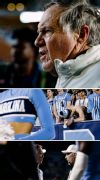 Over the past few weeks, the discussions have focused inordinately on whether North Carolina can get to six wins, a .500 record, and squeeze its way into a bowl game for the seventh straight season. Considering that 82 schools play in bowl games, and considering that two of UNC's wins are over Richmond and Charlotte, the bar is low enough to be subterranean. And even after Saturday's loss to Duke, there is the possibility that a win over North Carolina State on Saturday could get the Tar Heels into a bowl game on the virtue of their Academic Progress Rate if there are not enough six-win teams to fill out the bowl schedule. Belichick, predictably, has waved away questions about the postseason, perhaps unwilling to acknowledge the truth: An invite to the Gasparilla Bowl, especially one based on a technicality, would be a far sadder end to his first college season than a week in the office poring over the names appearing in the transfer portal. But as evening becomes night on this Saturday in Chapel Hill, a five-point win over a bad Stanford team has UNC's athletic director and chancellor standing toward the back of the room, bouncing and smiling with happiness and, no doubt, relief. Notably absent -- for the first time in Belichick's postgame news conferences -- is his girlfriend, Jordon Hudson. A New York Post article on Friday offered a potential reason for Belichick's tardiness and Hudson's absence: After the game, the outlet reported, Belichick's daughter-in-law Jen, the wife of defensive coordinator Steve Belichick, spent 40 minutes berating Bill and Hudson in the coach's office. Belichick seems unaffected. He has opened the floor, and the questions begin to stray beyond the normal margins. He's asked about the logo on his quarter-zip, an interlocking diagonal UNC that, a reporter suggests, might be a throwback to the 1950s, when Belichick's father was a Tar Heels assistant. "It's from Lawrence Taylor's time," Belichick says. But it's a question regarding the development of young players that hot-wires him into a different space. He started this thing called Sunday Night Football, a controlled scrimmage between players who didn't suit up for the game that weekend. They play the theme song from the "Sunday Night Football" broadcast through the speakers at Kenan Stadium. Every coach in the program watches, every player is in attendance, every play is filmed from all the angles, like it's happening in a full stadium on a Saturday afternoon. "Everybody's out there," receivers coach Garrick McGee says, "and everybody's into it." The game is followed by a Tuesday or Wednesday night meeting with Belichick and the SNF participants. He spends at least an hour going over the film and relaying the notes he requires his assistants to take and provide to him. McGee has been a college coach, including a head coach, for 29 years, and he says, "I've been doing this a long time, and this is different than any place out there. The meeting Bill has with the players is something I've never seen before." Belichick shrugs and says, "It's something we've always done, going all the way back to Cleveland. ... When your players who don't get a lot of playing time just run the other team's plays, it's hard for you to evaluate how they can run your plays. We created those opportunities to see how they're progressing in running our stuff. I want to see our players running our plays, to make sure they can do what we need them to do, not just running plays off cards from something Virginia ran, or Stanford ran." He's rolling now. There's a spark, a cadence to his words that makes this feel like we're in a classroom and not a news conference. This is his turf: running drills off to the side, working on "basics" with the non-regulars after practice every single day, seeing something nobody else sees. He's trying to remind everyone: This is a system, and it's proven. It's an attempt to take back whatever he feels has been lost in the months since he signed on to this job and lived through the seeming embarrassments of the 24-year-old Hudson appearing to stage-manage an interview on "CBS Sunday Morning" (something the coach attributed to "selectively edited clips and stills from just a few minutes of the interview to suggest a false narrative") and the routs at the hands of TCU and Clemson, and the boos and emptying stands at Kenan Stadium, and the revelation that his buddy and general manager Michael Lombardi (salary: an NCAA-best $1.5 million) took a trip to Saudi Arabia seeking funding for the program, and the indignity of having to issue a statement affirming his commitment to the Tar Heels after rumors spread that he would be open to a buyout after The Athletic reported, five games in, that his team was rife with dysfunction. He rattles off the names of players who have gone from Sunday Night Football to regular and productive playing time: receiver Madrid Tucker, running backs Demon June and Benjamin Hall. Turns out the man whose late career has centered on one unanswerable question -- Did Belichick create Tom Brady or did Brady create Belichick? -- was just setting up for the mic drop: "That's what Brady did the whole 2000 season," he says. "He never played. He was the fourth-string quarterback, but he did all those plays -- running our offense against our defense. The guys who didn't play, that's what a lot of them did. They weren't great. They weren't even good. But a lot of them became good, and some of them became great." This, you think, is it: This is why they believe, and why North Carolina, a basketball school desperate to find its spot in the college football firmament, is paying him $50 million for five years. This is why they still believe.
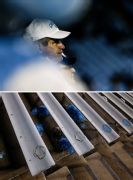 BELICHICK'S FIRST STOP on campus after his hiring was the men's lacrosse office. Belichick is a lacrosse fanatic: He was the captain of the team at Wesleyan, his sons played the sport, his daughter coaches at Holy Cross. It's hard to say lacrosse is his happy place -- this is Belichick, after all -- but it seems to serve as a refuge. Head coach Joe Breschi returned to his office that day in mid-December to find a note: "First stop on campus: visiting lacrosse office - BB" Lacrosse, a spring sport, shares a practice field with the football team. Belichick watched one of the team's early spring practices, and he was confused by the temporary tape on the field to designate the crease around each goal. "We've never been allowed to line the football field," Breschi told him. Under Breschi, the Heels are consistently one of the top teams in the country. They won the 2016 national championship, but they've never been deemed significant enough to mark their own territory. "I'll take care of it," Belichick said. Breschi, 11 months later, remains unable to contain his amazement. "The next day," he says. "The very next day, there were lines on the field. We got the field lined! I've been here 18 years and never got the field lined." Belichick has become something of a Professor of Championships on the Chapel Hill campus. He gave a speech to Breschi's lacrosse team last spring, and just last week he addressed the NCAA top-seeded field hockey team before it lost to No. 2 Northwestern in the Final Four on Friday. Head coach Erin Matson introduced Belichick: "For any field hockey program, it's always going to be rare for the head football coach, especially during game week, to come over and take time out of their week and talk to you guys. But it's extremely rare that we get coach Bill Belichick." Belichick stood before them and said, "You plan for what's going to happen, but once the game starts, you play the game." It's a similar message heard by the men's lacrosse team. Belichick spoke to the team after he ordered the field to be lined, and shortly afterward, Breschi got a message from Belichick. "He wanted to know if we had any extra sticks and sweatshirts lying around," Breschi says. He rounded up six of each. "So you know what we're wondering, right?" Breschi asks. "We're wondering if he's playing lacrosse in his free time."
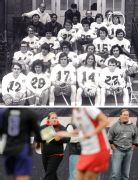 LOOKING OUT OVER Kenan Stadium on a gorgeous November Saturday, homecoming no less, the stands less than half filled 20 minutes before kickoff as three military paratroopers glide gently to midfield, it takes some work to imagine why the season began with such high expectations. Despite having 70 new players, the excitement was fueled by a belief that Belichick could magically transform an entire program through the sheer force of his personal history. The university issued statements from Brady and UNC great Taylor, who said, "Carolina got a chance to win it all." "There was unprecedented hype," says Adolfo Alvarez, UNC's student body president. "Our opener was prime time on a holiday [Labor Day]. It was a new era for the university, and the entire day was a celebration. Michael Jordan was there, Mia Hamm was there. When the pregame video showed Belichick, everybody went crazy. It was like, 'This is really happening.' "Then the game kicked off." It's all overly documented, every loss seemingly engineered to inflict maximum pain: TCU 48-14 in that opener; Clemson 28-3 after the first quarter; a final-play fumble at the goal line that would have beaten Cal; a failed 2-point conversion that would have beaten Virginia; a backsliding and dispiriting loss to Wake Forest to drop to 4-6; Saturday's loss to Duke made possible by a late fourth-quarter fake field goal the Heels were comically unprepared to defend. "They paid $14 million for a football team that's really not very good, and that doesn't count the money they paid for the coaches," says a source who works closely with the UNC athletic department and requested anonymity to speak freely. "At the very least, that feels like a very bad business decision." The busiest guy in the program is the one who makes sure the punt team is ready. The Heels are scoring 18.7 points per game, 121 out of 134 FBS teams. The roster formation, handled mostly by people with no experience with the NCAA's ever-changing landscape, looks in retrospect to have been haphazard. Quarterback Gio Lopez is being paid a reported $4 million over two years despite being rated ESPN's No. 100 player in last season's portal. He has improved throughout the season, but he is a left-handed passer who struggles to throw moving to his right, a fact that serves to shorten the playbook. Belichick's devotion to him -- "We're just trying to win the game" -- has been a recurring question after every game. The one salvation has been the defense, coordinated by Belichick's son Steve. "There was a certain investment in the team," Alvarez says, "and people wanted results." Bill Belichick declined an interview request for this article but did respond to a few emailed questions. Asked what he learned from his first run through the new and mostly untamed NCAA landscape, where every player is an annual free agent, he responded, "I try to be as honest as I can about our program. We want student-athletes to come here who want to work hard every single day and strive to be their best to help the team be successful, so I would not do anything differently than we have in the past." 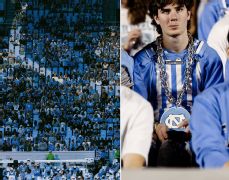
EVERY STORE ALONG Franklin Street in Chapel Hill selling UNC gear carries a gray hoodie, sleeves cut off, with "Chapel Bill" written across the front in Carolina blue. Back in the heady days, before the team played a game, the slogan was trademarked by a company owned by Belichick and managed by Hudson. "We couldn't keep them on the shelves when he first got here," an employee in one of the non-licensed shops told me in early November. "Lately the only ones we sold were for Halloween costumes." Couples went out as Bill and Jordon, she says. The guys wore the hoodies with a visor, and their girlfriends wore cheerleading outfits. The seepage of his personal life into the public realm is the most unbelievable twist of the entire Belichick saga. This is a man whose entire coaching image was predicated upon avoiding controversy and encouraging his players to do the same, and now, his relationship with a woman nearly five decades younger has thrown him straight into the national fixation with glorious nothingness. From the moment Belichick was hired, Hudson took an active role in communicating with the university's athletic department. They had been appearing together publicly since 2024, and she was, at Belichick's behest, included in all emails directed to the coach. According to emails acquired first by The Assembly through a Freedom of Information Act request, she demanded to know whether the university was actively monitoring the school's Facebook page "for slanderous commentary and subsequently deleting it/blocking users that are harassing BB in the comments." Told that they were following university guidelines regarding threats and hate speech, Hudson responded, "I understand what the policy is -- are we doing anything to enforce or monitor it?" She began another email regarding the perception that Steve Belichick might owe his job as defensive coordinator to nepotism by writing: "I would like to preventatively raise awareness regarding a sometimes subtle, sometimes obvious, frequently occurring detail within media releases and social media posts." She asked that the university not use photos of Steve and Bill together lest they be viewed as "visual prompts" to charge Belichick of nepotism. (There is no mention of Belichick's son Brian, a Tar Heels defensive backs coach, or Matt Lombardi, Michael's son and the team's quarterbacks coach.)  There were angry emails from professors and alums, asking why the university was serving as a publicist for Hudson. It turned into a never-ending vortex of gossip and speculation. Pablo Torre, on his podcast "Pablo Torre Finds Out," turned l'affaire Hudson into his own cottage industry. On April 29, a professor of public law and government, Christopher B. McLaughlin, wrote an email to athletic director Bubba Cunningham with the subject line "please end this circus." He continued: "When you agreed to pay a king's ransom to hire Bill Belichick, did you also know that you were hiring Jordon Hudson to serve as the primary face of UNC athletics?" Reached via email, McLaughlin declined to comment. "Obviously, anybody can date anybody they want," says Alvarez, the student body president. "But the coach does report to the university, and you have to show people you're focused on coaching. Your personal life shouldn't have too much overlap into your job. I think it was the CBS interview that caused people to say, 'OK, what's going on?'" The focus has shifted as Hudson has receded into the background and the Tar Heels' season has dragged on. (Although her attempt to trademark the term "gold digger" in late August, in the middle of the storm, was objectively hilarious, and a sign that she is willing to merrily lean in.) But there was Belichick, the day after the Wake Forest game, the man who would have been the unanimous winner of Least Likely to Attend Cheer Extreme Code Black's performance in a coed competition at Dorton Arena in Raleigh, North Carolina, attending Cheer Extreme Code Black's performance in a coed competition at Dorton Arena in Raleigh, North Carolina. In the photo that made its way across the internet, Belichick stood against a wall watching Hudson's Code Black team perform. (Hudson, the second runner-up in the Miss Maine USA pageant this year, won a collegiate cheerleading championship at Bridgewater State in 2021.) The look on his face as he watched the backflips and human pyramids was familiar. He looked like he was facing a group of reporters.
MAYBE THE SADDEST part, for now, is the football. Belichick has been routinely outcoached, by Wake Forest's Jake Dickert and Duke's Manny Diaz and Clemson's beleaguered Dabo Swinney. His team does not display the typical Belichick hallmarks of discipline and preparedness. Against Duke, the Tar Heels had more penalty yardage (103) than rushing yards (101) and had two offensive personal fouls. The Heels have displayed a seasonlong aversion to open-field tackling. Diaz caught Belichick's team off guard with a trick play -- an offensive tackle split wide as an eligible receiver and the tight end in the tackle spot -- that Belichick devised with the Patriots. This, the sloppiness and the inattention to detail, is not what anyone in Chapel Hill expected. 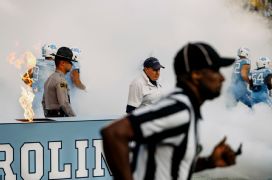 Case in point: a week ago Saturday at Wake Forest, 27 seconds left, Wake leading 21-12. The Demon Deacons had the ball on the UNC 2-yard line, fourth down. The Wake Forest players were celebrating, the game was over, all that was left was a kneel-down to close it out. But then Belichick, for reasons that remain elusive, called timeout. And Wake Forest, perhaps deciding what the hell, ran a play and scored a touchdown to win 28-12. What was he doing? What was the motivation? Was it a test to see whether Dickert would take the bait or take a knee? Did he misread the score? Regardless, Belichick clearly didn't approve of the path Dickert chose. As the coaches headed for midfield for the traditional handshake, Dickert removed his cap in a clearly deferential manner, and Belichick brushed past him with a drive-by handshake that didn't appear to include any eye contact. After engaging in the lengthy back-and-forth after the Stanford game, Belichick was back to normal: weary, short, impatient. He said he was "just trying to keep the game alive" by calling the timeout. "I didn't know what they were going to do. Block a field goal, make a stop. I mean, we keep competing." He was asked what he said to Dickert during the brusque handshake. Belichick shrugged and stared. He seemed to be looking for a way to avoid answering the question. He shrugged again. "Congratulations?" he said, unconvincingly. "I don't know." The hope generated by two straight ACC wins vanished. He answered questions for roughly five minutes. Lombardi, whose reputation as a self-promoter is renowned in NFL circles, touted the Heels by using the much-mocked term "33rd NFL team," owing to the vast NFL experience of its coaching staff. Shortly after his hiring, he boasted, "We're not here to finish fourth in the ACC. We're here to compete for championships." After the Wake Forest debacle, Lombardi was asked on his weekly radio show if he had a message for the fans leading up to the final home game Saturday against Duke. It turns out Lombardi did. "I just hope everybody uses their tickets."
|


